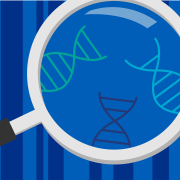Screening the healthy for monogenic variants
As the NHS moves towards a preventative healthcare strategy, will genomic screening for healthy people become more common?
Two recent studies have shed light on the benefits of screening for conditions that are caused by a single gene. Both studies focused on finding actionable, monogenic variants that, once identified in patients, could allow for faster and more effective treatment.
Findings from the research show that more people have monogenic variants than was previously thought, strengthening the case for wider population screening.
Four variants found
The first study, published in Genetics in Medicine, discovered four new genetic variants that could be effectively used in screening. Using UK BioBank data, a team of researchers looked for variants with similar potential to the three already designated as ‘Tier 1’ by the US Centers for Disease Control and Prevention: BRCA-related cancers, Lynch syndrome (associated with colorectal and other cancers) and familiar hypercholesterolaemia (associated with cardiovascular disease).
All of these conditions have variants that are present in 1% of individuals, though the majority are unaware that they are at increased risk.
The researchers found a further four gene variants that would meet these criteria: one associated with diabetes, one with beta-thalassaemia minor and intermedia, one with cystic kidney disease and one with the development of cataracts. In all cases, early detection through screening has the potential to improve outcomes.
Benefits of wider screening
The second study, published in BMC Medicine, looked at how many people could potentially benefit from wider screening for harmful genetic variants. They performed a targeted search for 147 variants that are known to be associated with monogenic conditions within cardiovascular disease, cancer and other important clinical areas.
After testing over 10,000 adults in the USA, Canada and Singapore, the researchers found that over 15% of people had at least one risk-increasing variant, with 1.3% of people having two or more.
Of those carrying a variant:
- around 50% had a variant associated with hereditary cancer – most commonly colorectal, breast and/or ovarian cancers or melanoma; and
- 37.6% had a variant associated with cardiovascular disease.
Other variants included one associated with malignant hyperthermia susceptibility – a condition that can result in a potentially life-threatening reaction to some drugs, including those used in anaesthesia.
The national strategy
The studies fall in line with the strategy set out by the NHS in the green paper ‘Advancing our health: prevention in the 2020s‘ published in 2019, which includes a section on genetic risk in health populations.
The paper discusses the importance of screening for monogenic variants and also talks about polygenic risk scores – a method for quantifying the cumulative effects of a number of genes, which may individually have a small effect on susceptibility to a condition.
Identifying those at higher risk “could allow individuals to make lifestyle changes that will help prevent disease or reduce its impact, lead to more effective prescription medicines and improve other public health interventions.”
Polygenic risk scores are still fairly new, however, and their application in predicting individual health risk is still being evaluated.
Want to learn more? Stay up to date with the latest health improvement guidance and research
–
Please note: This article is for informational or educational purposes, and does not substitute professional medical advice.









